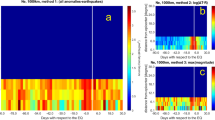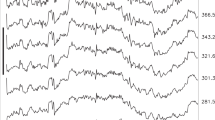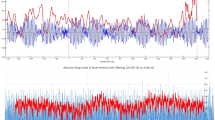Abstract
A RECENT study1 of the occurrence of sporadic E has shown that the percentage of the time ƒ0 E s > 5 Mc./s. exhibits a marked longitude effect, having a maximum (∼ 30 per cent) over south-east Asia and minima over South Africa (∼ 3 per cent) and the north-east part of the United States (∼ 6 per cent). That the effect is real, and not due to differences of equipment sensitivity, has been confirmed by very high-frequency forward scatter experiments over the Caribbean and the Philippines2. The suggestion was put forward that this longitude effect may depend in a complex manner on both geographical and magnetic latitudes or may be due to meteorological effects2.
This is a preview of subscription content, access via your institution
Access options
Subscribe to this journal
Receive 51 print issues and online access
$199.00 per year
only $3.90 per issue
Buy this article
- Purchase on Springer Link
- Instant access to full article PDF
Prices may be subject to local taxes which are calculated during checkout
Similar content being viewed by others
References
Smith, jun., E. K., “AGARDograph 34 Sporadic E Ionization”, 1 (NATO Advisory Group for Aeronautical Research and Development, 1958).
Smith, jun., E. K., and Finney, J. W., J. Geophys. Res., 65, 885 (1960).
Author information
Authors and Affiliations
Rights and permissions
About this article
Cite this article
HEISLER, L., WHITEHEAD, J. Longitude Effect in Temperate Zone Sporadic E and the Earth's Magnetic Field. Nature 187, 676–677 (1960). https://doi.org/10.1038/187676a0
Issue Date:
DOI: https://doi.org/10.1038/187676a0
This article is cited by
-
Sporadic E layer formation time
Radiophysics and Quantum Electronics (1968)
-
Formation of the Sporadic E Layer in the Temperate Zones
Nature (1960)
Comments
By submitting a comment you agree to abide by our Terms and Community Guidelines. If you find something abusive or that does not comply with our terms or guidelines please flag it as inappropriate.



